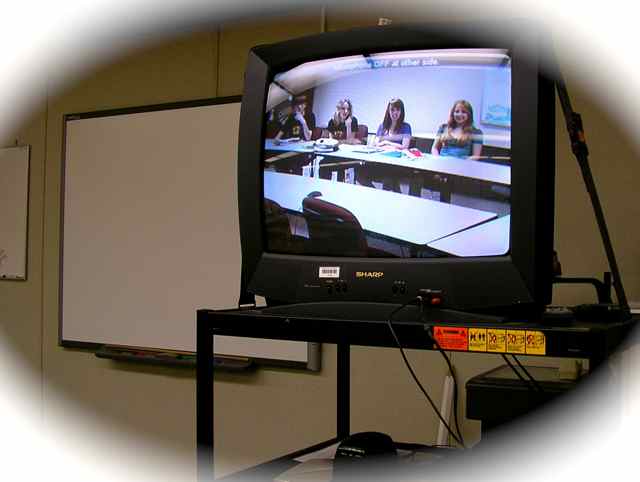In whose best interest? - ITV implementation
 Thursday, September 4, 2008 at 06:50PM
Thursday, September 4, 2008 at 06:50PM 
Tuesday was an historic day for my district. It was the first time we ever offered a class over Interactive Television during prime time of the school day to high school students.
And It was a qualified success. The equipment needed tweaking, there was no instructor as promised, and there were no textbooks, but the network connection worked and the kids seemed excited to be in Chinese II this year. I exhausted my vast knowledge of Mandarin (or maybe it was Cantonese) by teaching the nine students to say and define "moo goo gai pan."
Although ITV has been successfully used for over 20 years by our smaller neighboring districts, Mankato schools never took the plunge for a variety of reasons.
- As a larger district with three high schools, our incidence of low enrollment classes has never been great - we have the population to offer French III and AP Trig.
- With a state university and community college in town, most high school kids preferred to drive to campus and mingle with the big dogs rather than take college classes online.
- ITV offerings are "revenue negative" to districts whose students take them except to the district offering them, and our teachers and administrators have never exhibited enthusiasm for offering classes to other districts using the medium. In fact, with increased math and science requirements, fewer electives can be taken by students and there is greater competition for students by current teachers now offering elective classes in world languages, tech ed, art, and other areas. ITV offerings are viewed as unwelcome competition.
And while it was not a deciding factor, I personally found teaching college courses over ITV less satisfying that F2F instruction. Somehow I wound up with a stiff neck and a paranoid feeling that technology was out to get me after every class. I had a hard time promoting a technology that I myself do not much care for.
Studies show that ITV is more or less equal in effectiveness to F2F instruction, so its use is more of a political/philosophical decision rather than a pedagogical one. By offering Chinese II via ITV, even at the possible expense of the teachers of other electives in our district, we've chosen student needs over staff concerns.
I believe that was a good decision. Too often when it comes to technology and other innovations, staff comfort, school finances, and fear of the new trumps student and family needs.
But I'll bet you knew that already.








Reader Comments (5)
We just had a discussion about this today. Your neighbor state to the East has a fairly well-established and well-coordinated distance education network.
As a larger district, we do not participate and that decision has much to do with the idea of consumer -vs- producer in the context of an environment which does not provide monetary incentives for producers. The school networks essentially work towards a balance of produce and consume, and everything is quid pro quo.
My biggest issue with ITV is the synchronous aspect; the scheduling problems, the tendency towards lecture, the impersonality. When so many places are looking towards asynchronous methods, we seem to be stuck in a model which has either outlived its purpose, or has been implemented on too large of a scale.
First of all, let me clarify, once and for all, Doug, that technology IS out to get you. In fact, it already HAS you. Look how much time you spend with it...
ITV may not provide the same quality education experience as teaching face to face, particularly for the instructor. There are definitely advantages and disadvantages. The disadvanges immediately come to mind when I remember the person I once watched during an ITV delivered training who was picking ear wax out of his ear with such enthusiasm I was surprised he didn't draw blood.
There is a lot to be said, however, for the ablity of ITV to extend the reach of education opportunities to students in rural areas who might otherwise miss out. In northwest Minnesota, we use our ITV system to bring foreign language opportunities, including Mandarin Chinese, to our students who want and need them. We also use our system to so that educators and administrators can communicate which each other, for professional development, and to provide college courses to students in our high schools.
What I would really like to see us do is to combine the best aspects of computer-based online learning (engaging multi-media content delivered to students using tools they prefer) with the real-time teacher contact capability that many students need in order to successfully complete an online course. That combined with the eventual movement toward high definition ITV, would enrich the distance learning experience for both students and teachers.
@ Hi Joel,
Interesting comments. I agree that the economic model of ITV needs some improvement. Where I have seen the most financial fairness is when a consortium of small districts have a sharing agreement. And while public schools are not "for-profit" institutions, we all have finite budgets with which to provide services for the greatest number of students.
Scheduling both in terms of when classes begin and end as well as school calendars make coordination among districts difficult. Especially in MN where local control is the mantra for all things.
I would tend to disagree about the greater likelihood of lecture and impersonality. There is nothing inherent in the technology that creates this, IMHO. Good teachers are good teachers using ITV or F2F instruction. And ITV courses can as easily be supplemented with asynchronous resources as can F2F.
Thanks for writing and adding these concerns.
All the best,
Doug
@ Hi Mary,
Ah, spoken like a true ITV directors ;-) You're a fast study!
Extending educational opportunities is absolutely the key to the whole argument for ITV or any online instructional system. Whether as a class or a field trip, ITV and I2 have provided "big school" opportunities to a lot of smaller communities. Given the paucity of Chinese instructors in our area, we would not have been able to offer the class without it. You are right on here.
I also LOVE the use of ITV for meetings and informational sessions like your e-rate updates. Given the geographic size of MN, the Twin Cities traffic and cost of driving, the use of ITV has been a boon to us "greater-Minnesotans." Thanks for the reminder.
Oh, let's improve the sound quality along with the picture quality while we are at it. Seems especially important for world language classes.
Now I am getting off the computer and going to mow my lawn. Does the rider count as technology? Dang!
Doug
@Doug,
Ironically, I am in an ITV room as I write on break from our state's media and technology board meeting.
While I agree that in the hands of skilled teachers, good instruction can still take place. But, I believe it is more difficult to perform group discussion, promote interaction and debate, and do things that one might need to do in a regular F2F environment (science experiments come to mind). Can it be done... sure. Is it harder to coordinate on both ends - I believe so.
So on one side of the scales, I think something is lost in using synchronous distance ed models. Now, on th other side of the scale, something is gained - we reach new audiences, we allow programming where it may not exist, we might even allow the homebound student be a part of something previously not possible - all good things.
But, I would still argue that the DE environment produces barriers that F2F does not inherently have. Skilled people will navigate around them, but it takes time and energy. When we are busy, we pick and choose where to spend our time and energy.
Hi Joel,
I personally agree about the advantages of F2F. (Maybe I am just old school!)
For the me the questions comes down to Do we offer kids less than ideal learning situations or no learning opportunity at all? When it comes to Chinese for us and advanced language and math classes for some of our smaller districts, that is the hard choice that has to be made, unfortunately. Same way with field trips. I'd much rather go to a real zoo, but going virtually is better than no exposure at all, I guess.
Thanks again for the comments,
Doug